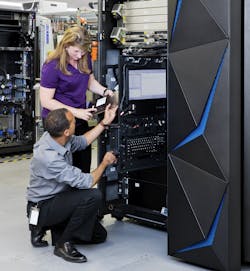IBM claims that its new processor can encrypt data on a massive scale, concealing credit card payments, travel site bookings, and government payrolls from the prying eyes of hackers.
On Monday, IBM announced that the new silicon powers its latest line of mainframes, which can automatically keep entire systems encrypted at all times. The z14 chip devotes around six billion transistors – four times more than previous z13 – exclusively to encryption, which encodes messages only decipherable with special keys.
The new encryption chip runs at 5.2 gigahertz to process more than 12 billion transactions every day ranging from ATM withdrawals to flight reservations. Manufactured on the 14 nanometer node, it contains 10 computing cores that can encrypt 13 gigahertz of data per second. The z13 could only process around 2.5 billion transactions every day.
IBM claims that it handles encryption more cheaply and efficiently than rival server systems, which burn through massive amounts of computing power to encrypt and decrypt data. The system’s security prowess could be a unique selling point for businesses that typically only encrypt limited lumps of data.
Most corporations have been slow to open their wallets for large scale encryption. Only around 4% of all the data stolen worldwide since 2013 was encrypted, IBM says. And only around 2% of information in corporate servers is encrypted today, as opposed to almost 80% of mobile data, according to consulting firm Solitaire Interglobal.
“The vast majority of stolen or leaked data today is open and easy to use because encryption has been difficult and expensive,” said Ross Mauri, general manager of IBM’s Z mainframe business, in a statement. “We created a data protection engine for the cloud era to have an immediate and significant impact on global data security.”
To protect encryption keys, IBM created special circuitry that acts like dye packs hidden in bank vaults to foil robberies. When the hardware detects malware or other intruders prying into memory, it can throw out the keys and restore them once the coast is clear again.
Other companies are remaking chips to expedite cryptography in cloud servers. Intel’s newest Xeon Scalable processors, for instance, encrypt and decrypt messages without having to save keys in memory, while Advanced Micro Devices added a security subsystem in its Epyc server chips that encrypt data stored in memory.
The mainframe announcement comes at a particularly painful point for IBM. On Tuesday, the company, which has been trying to reorient the business toward cloud computing and data analytics, reported revenues of $19.3 billion in second quarter, down from $20.2 billion the same last year. It is IBM’s twenty-first consecutive quarter of revenue decline.
About the Author
James Morra
Senior Editor
James Morra is the senior editor for Electronic Design, covering the semiconductor industry and new technology trends, with a focus on power electronics and power management. He also reports on the business behind electrical engineering, including the electronics supply chain. He joined Electronic Design in 2015 and is based in Chicago, Illinois.

